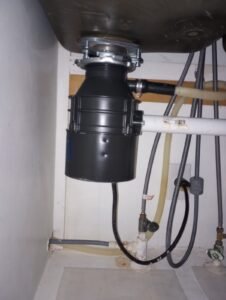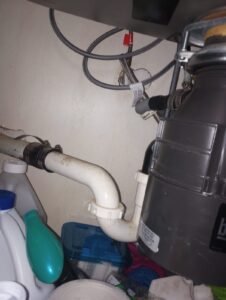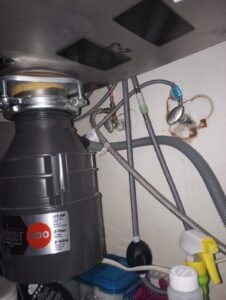Garbage Disposal Maintenance
In the modern kitchen, the garbage disposal has become an indispensable tool, streamlining waste management and enhancing cleanliness. This device not only simplifies kitchen chores but also plays a crucial role in environmental sustainability by efficiently managing food scraps.
However, the effectiveness of garbage disposal hinges on proper maintenance and usage. Regular care is essential to prevent issues like clogs and breakdowns, ensuring the appliance functions efficiently and lasts longer. This blog serves as a comprehensive guide, offering essential tips for maintaining your garbage disposal. We’ll cover the do’s and don’ts, troubleshoot common problems, and discuss when to seek professional help. Whether you’re a first-time user or looking to improve your maintenance routine, this guide aims to equip you with practical knowledge to keep your garbage disposal in top condition.
Understanding Your Garbage Disposal
To effectively maintain and troubleshoot your garbage disposal, it’s crucial to first understand its basic mechanics and the different types available. This knowledge not only helps in proper usage but also in identifying and resolving issues more efficiently.
Basic Mechanics of a Garbage Disposal: A garbage disposal is essentially a motorized device installed under your kitchen sink, connected to the drain. It includes a grinding chamber where food waste is shredded into small pieces, small enough to pass through your plumbing system without causing clogs. When you turn on the disposal, an electric motor powers a spinning disc, or impeller plate, which rapidly turns, forcing the food waste against a stationary grind ring. The grind ring breaks down the waste into fine particles. Water running from your sink helps flush these particles through the grind ring and into the plumbing system.
The process is straightforward but effective, relying on the power of the motor and the sharpness of the impellers and grind ring. It’s important to note that garbage disposals are designed to handle light food residue that is rinsed from plates and cooking utensils before they are placed in the dishwasher.
Types of Garbage Disposals: There are two primary types of garbage disposals, each catering to different needs and preferences:
- Continuous Feed Garbage Disposals: The most common type found in homes, these disposals operate continuously as long as the power switch is turned on. They are convenient for disposing of large amounts of waste at once. You can keep adding waste as the unit runs, but this requires caution to ensure non-disposable items don’t accidentally fall in.
- Batch Feed Garbage Disposals: These disposals are designed for added safety. They only operate when the disposal lid is covered, preventing accidental injury or unwanted items from falling in. Batch feed models are ideal for households with small children or for individuals who prefer an extra layer of safety.

Maintenance Do’s: Ensuring Longevity and Efficiency
Proper garbage disposal maintenance is essential for ensuring its longevity and efficiency. By adhering to regular cleaning practices, safe usage habits, and understanding the importance of water usage in garbage disposal maintenance, you can keep your disposal functioning optimally for years.
Regular Cleaning Practices for Garbage Disposal Maintenance:
- Routine Flushing: After each use, run cold water through the disposal for about 20-30 seconds. This garbage disposal maintenance step flushes out any remaining food particles, a crucial aspect of maintaining your disposal.
- Bi-Weekly Deep Cleaning: To prevent odor and buildup, a key part of garbage disposal maintenance is cleaning your disposal every two weeks. Use a mixture of mild dish soap and warm water or a combination of baking soda and vinegar. Pour this solution into the disposal, let it sit, and then run it with cold water, a vital step in garbage disposal maintenance.
- Ice Cube Trick: Occasionally, grind a few ice cubes in the disposal for maintenance. This helps dislodge food particles stuck on the blades and sharpens the impellers, an innovative approach to garbage disposal maintenance.
- Citrus Freshness: For a natural approach to garbage disposal maintenance, grind citrus peels, like lemon or orange. This not only freshens up your disposal and kitchen but also helps clean the blades.
Safe Usage Habits for Garbage Disposal Maintenance:
- Avoid Hard and Fibrous Materials: In your garbage disposal maintenance routine, ensure not to put hard items like bones or fruit pits, or fibrous materials like corn husks into the disposal. These can dull the blades and cause clogs, hindering proper garbage disposal maintenance.
- No Grease or Oil: A key garbage disposal maintenance tip is to avoid pouring grease, oil, or fat down the disposal as they can solidify and clog your drain.
- Gradual Disposal: Feed waste gradually into the disposal instead of cramming large amounts at once. This garbage disposal maintenance practice prevents overloading the motor and jamming the blades.
- Use Cold Water: Always use cold water when running the disposal, a crucial aspect of garbage disposal maintenance. Cold water solidifies grease or oils, making them easier to grind and flush away.
Importance of Water Usage in Garbage Disposal Maintenance:
- Adequate Water Flow: Ensure there is sufficient water flow when the disposal is running. Water is essential in garbage disposal maintenance for moving the ground waste through the plumbing system.
- Pre and Post-Operation Water Flow: Turn on the water before you start the disposal and keep it running for a few seconds after turning off the disposal. This step in garbage disposal maintenance ensures all waste is flushed through the pipes.
- Avoid Hot Water: While hot water is great for cleaning dishes, it’s not ideal for garbage disposals during operation as it can melt fats, causing them to stick to the blades and pipes, a crucial consideration in garbage disposal maintenance.
Maintenance Don’ts: Common Mistakes to Avoid
Proper maintenance of your garbage disposal isn’t just about what you should do; it’s equally important to be aware of what not to do. Avoiding certain items and understanding common misconceptions can prevent damage and extend the life of your disposal.
Items Not to Put in Your Disposal:
- Non-Food Items: Never put plastic, metal, glass, or paper products in your disposal. These materials can damage the blades and motor.
- Grease, Oils, and Fats: These can solidify inside the disposal and pipes, leading to clogs and bad odors.
- Fibrous Foods: Vegetables like celery, onion skins, and corn husks can wrap around the blades and cause jams.
- Starchy Foods: Items like pasta, rice, and potatoes can expand in the presence of water and create blockages.
- Coffee Grounds: While they won’t harm the disposal, they can accumulate in pipes and cause clogs.
- Egg Shells: The membrane layers can stick to the sides of the disposal and wrap around the shredder ring.
- Bones and Fruit Pits: These hard materials are too tough for most disposals and can blunt the blades.
Misconceptions About Garbage Disposal Care:
- Lemons Clean Blades: While lemons can help with odors, they don’t actually sharpen or thoroughly clean the blades.
- Hot Water is Best for Cleaning: Hot water can liquefy grease, causing it to coat the blades and pipes. Cold water is generally better during disposal operations.
- Running Disposal Without Water: Always run water when using the disposal. Running it dry can lead to motor burnout and ineffective waste disposal.
- Ice Sharpens Blades: Grinding ice can help clean the blades but doesn’t actually sharpen them. It’s more about removing gunk and buildup.
- It Can Handle All Food Waste: Some food wastes, like the ones mentioned above, are not suitable for garbage disposal and can cause damage or clogs.
By avoiding these common mistakes and understanding what not to put in your disposal, you can prevent many common issues. Remember, the garbage disposal is designed to handle light food residue, not as a substitute for the trash can or compost heap. Treat it with care, and it will remain a valuable asset in your kitchen.

Troubleshooting Common Issues in Garbage Disposal Maintenance
Even with diligent garbage disposal maintenance, you may encounter some common issues like jamming, clogs, unusual noises, and odor problems. Understanding how to address these can be a crucial part of your garbage disposal maintenance routine.
1. Jamming:
- In Garbage Disposal Maintenance: Jamming is a frequent issue. It often occurs when hard or fibrous items are disposed of improperly.
- Solution: First, ensure safety by turning off the disposal and cutting the power. Use a flashlight to inspect for objects causing the jam. If accessible, use pliers to remove the item. Some models have a hex key slot at the bottom, allowing you to manually turn the blades and dislodge the jam.
2. Clogs:
- A Common Challenge in Garbage Disposal Maintenance: Clogs can happen when too much waste or inappropriate items are disposed of at once.
- Solution: To tackle clogs, first try a plunger. If ineffective, check the U-bend under the sink (place a bucket underneath before removing it). Clear any blockages and reassemble. Persistent clogs may require a plumber’s snake or professional assistance.
3. Unusual Noises:
- Identifying Noises in Garbage Disposal Maintenance: Strange noises like grinding or rattling often indicate foreign objects in the disposal or a mechanical issue.
- Solution: After turning off the power, inspect for any visible objects and remove them. If the noise persists without any obstructions, it could be a mechanical problem, signaling the need for professional repair.
4. Odor Problems:
- Addressing Odors in Garbage Disposal Maintenance: Foul odors usually arise from trapped food particles and residue.
- Solution: Regular cleaning is key. Grind citrus peels or a mix of ice and salt to clean the blades and remove odors. Baking soda and vinegar can also help neutralize smells. Persistent odors might indicate a deeper issue, such as a need for more thorough cleaning or a clog further down the drain.
Professional Care and When to Seek Help
Effective garbage disposal maintenance involves not only regular home care but also recognizing when it’s time to call in the professionals. Understanding when professional maintenance is needed and the role of professional inspections can save you from costly repairs and ensure your disposal operates at its best.
Recognizing When Professional Maintenance is Needed:
- Persistent Issues: If you’ve tried troubleshooting common problems like clogs or jams and they persist, it’s time to seek professional help. Continuous issues can signal deeper problems that require expert attention.
- Unusual Noises or Poor Performance: If your disposal is making unusual sounds or isn’t performing as efficiently as it should, despite your maintenance efforts, a professional can diagnose and resolve these issues.
- Leaks: Water leaks from your disposal unit or related plumbing require immediate professional attention. Leaks can lead to more significant problems, including water damage and mold.
- Electrical Problems: If your disposal is experiencing electrical issues, such as frequent resets or a failure to turn on, professional service is necessary for safety and functionality.
The Role of Professional Inspections:
- Comprehensive Evaluation: Professionals can conduct a thorough inspection of your disposal, identifying any wear and tear, blade sharpness, motor efficiency, and potential electrical issues. This comprehensive evaluation can catch problems early, preventing more significant issues down the line.
- Expert Repairs and Replacements: Sometimes, parts of your disposal may need to be repaired or replaced. Professionals have the expertise and tools to safely and effectively perform these tasks.
- Tailored Advice: Based on their assessment, professionals can provide personalized advice on maintaining your specific model of garbage disposal, helping you avoid future problems.
- Safety Assurance: Dealing with garbage disposal, especially when it involves electrical components, can be risky. Professionals are trained to handle these risks, ensuring the safety of your household and the proper functioning of the unit.

Enhancing Your Disposal’s Performance
To get the most out of your garbage disposal and ensure it operates at peak efficiency, consider implementing upgrades and accessories, as well as adopting eco-friendly practices. These enhancements not only improve the functionality of your disposal but also contribute to a more sustainable and efficient home.
Upgrades and Accessories:
- High-Quality Blades: Upgrading to disposal with stainless steel blades can enhance grinding efficiency and durability.
- Noise-Reduction Technology: Some modern disposals come with advanced insulation and noise-reduction features, making them much quieter during operation.
- Auto-Reverse Function: This feature helps prevent jamming by automatically reversing the grinding direction if something gets stuck.
- Septic Tank Assist: If you have a septic system, consider a disposal designed for septic tanks, which often includes features to help break down food waste more effectively.
- Splash Guards: Upgrading or replacing your splash guard can help reduce the amount of debris that might inadvertently fly out during use.
Eco-Friendly Practices:
- Composting: Instead of relying solely on your disposal, start a compost bin for organic waste. This reduces the load on your disposal and creates valuable compost for your garden.
- Mindful Disposal Use: Be conscious of what you put down at your disposal. Avoid items that are better suited for the trash or compost to reduce energy use and the risk of clogs.
- Regular Cleaning with Natural Products: Use eco-friendly cleaners like baking soda and vinegar for regular cleaning, avoiding harsh chemicals that can harm the environment.
- Water Conservation: Be mindful of the amount of water you use at your disposal. While it’s important to run water when using the disposal, try to use only what’s necessary.
- Energy-Efficient Models: If you’re considering a new disposal, look for energy-efficient models that use less power without compromising performance.
By incorporating these upgrades and eco-friendly practices into your garbage disposal maintenance routine, you not only enhance the performance of your disposal but also contribute to a more sustainable and environmentally friendly kitchen. These small changes can have a significant impact on the efficiency and longevity of your disposal, as well as on the overall eco-friendliness of your home.
Expert Guide to Garbage Disposal Maintenance: Tips, Tricks, and When to Call Plumbing Therapist
In conclusion, effective garbage disposal maintenance is a blend of regular self-care, understanding the nuances of your unit, and knowing when to call in the experts. From routine cleaning to addressing common issues like clogs and odors, your disposal requires attention and care to function at its best. Remember, while many issues can be resolved with simple at-home solutions, there are times when professional assistance is invaluable.
This is where Plumbing Therapist comes into play. When faced with persistent problems, complex repairs, or if you’re in need of professional advice, don’t hesitate to reach out to them. Their expertise in handling a wide range of plumbing issues, including garbage disposal challenges, makes them an ideal partner in maintaining the health and efficiency of your disposal unit.
By following the maintenance tips outlined in this blog and knowing when to call in the professionals at Plumbing Therapist, you can ensure that your garbage disposal remains a reliable, efficient, and long-lasting part of your kitchen. Regular care, combined with professional support, is the key to a hassle-free, functional disposal system. Remember, a well-maintained garbage disposal is not just about convenience; it’s about contributing to a more sustainable and efficient home.

